Corporate Law Assignment: JCI Ltd Liability and Ringo's Legal Recourse
VerifiedAdded on 2023/06/04
|6
|1781
|408
Homework Assignment
AI Summary
This assignment examines two legal issues under the Corporations Act 2001 (Cth). The first question analyzes whether JCI Ltd. is liable for a contract entered into by Kruger with Anglo-American, focusing on the Turquand rule and the implications of s128-129 of the Corporations Act 2001 (Cth) regarding assumptions made by third parties dealing with a company. It considers Kruger's authority, Oppenheimer's suspicions, and the potential release of JCI Ltd. from the contract. The second question addresses the remedies available to Ringo as a shareholder, concerning a general meeting held without notice, changes to the company logo and constitution, and Paul's misuse of company funds. It explores Ringo's rights regarding statutory derivative action, unfair conduct, and breaches of the Corporations Act, ultimately determining which remedies are available to him.
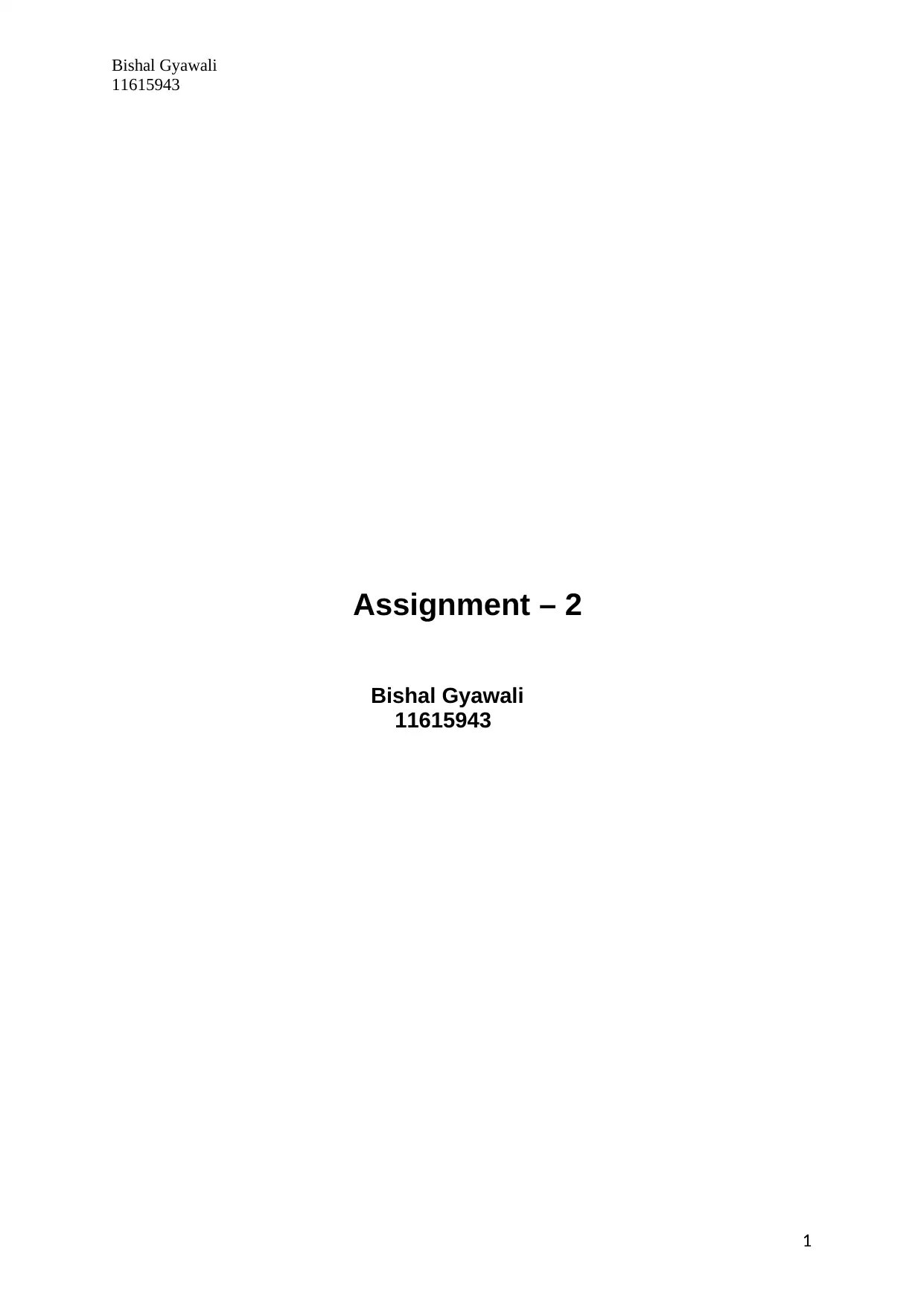
Bishal Gyawali
11615943
Assignment – 2
Bishal Gyawali
11615943
1
11615943
Assignment – 2
Bishal Gyawali
11615943
1
Paraphrase This Document
Need a fresh take? Get an instant paraphrase of this document with our AI Paraphraser
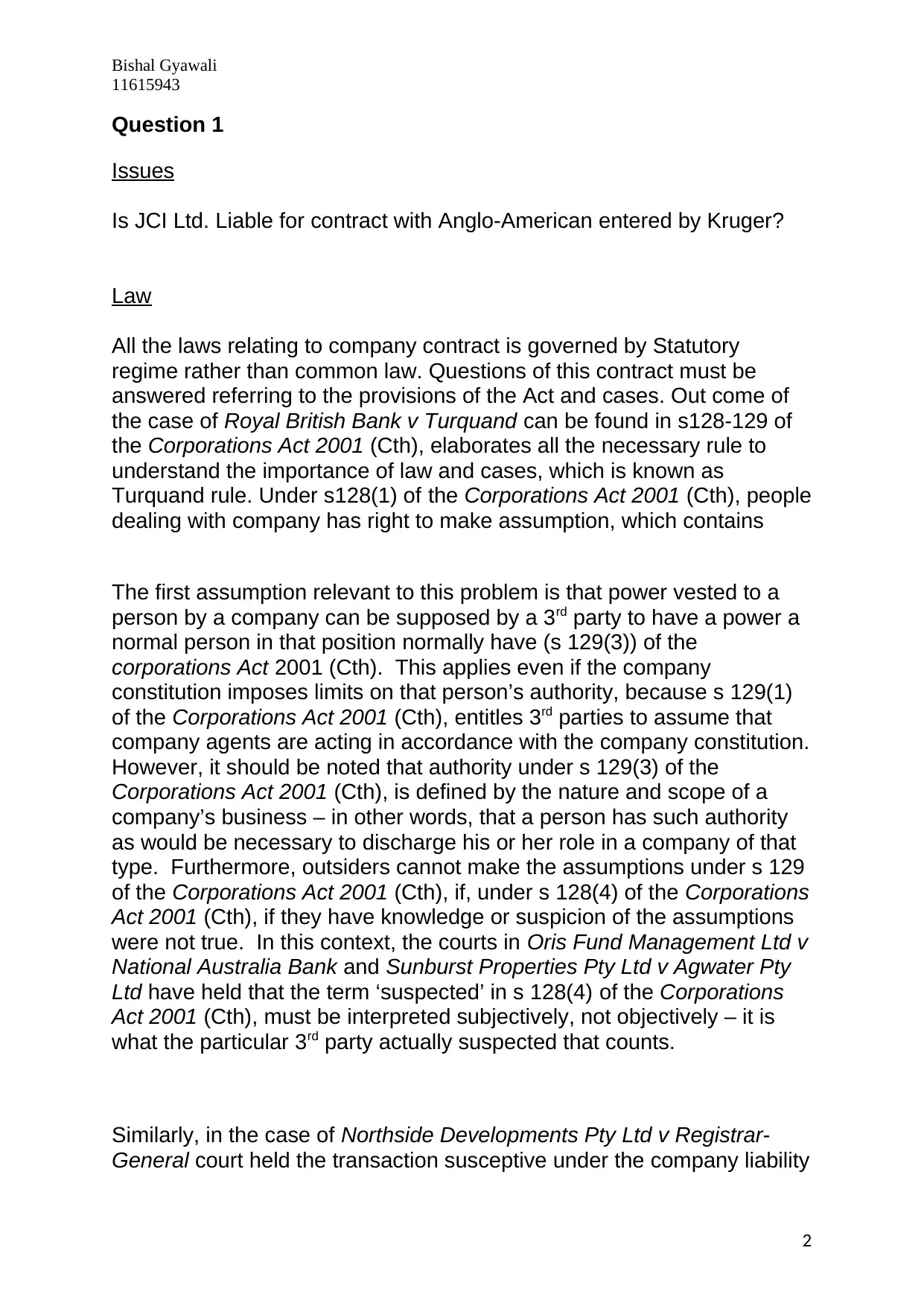
Bishal Gyawali
11615943
Question 1
Issues
Is JCI Ltd. Liable for contract with Anglo-American entered by Kruger?
Law
All the laws relating to company contract is governed by Statutory
regime rather than common law. Questions of this contract must be
answered referring to the provisions of the Act and cases. Out come of
the case of Royal British Bank v Turquand can be found in s128-129 of
the Corporations Act 2001 (Cth), elaborates all the necessary rule to
understand the importance of law and cases, which is known as
Turquand rule. Under s128(1) of the Corporations Act 2001 (Cth), people
dealing with company has right to make assumption, which contains
The first assumption relevant to this problem is that power vested to a
person by a company can be supposed by a 3rd party to have a power a
normal person in that position normally have (s 129(3)) of the
corporations Act 2001 (Cth). This applies even if the company
constitution imposes limits on that person’s authority, because s 129(1)
of the Corporations Act 2001 (Cth), entitles 3rd parties to assume that
company agents are acting in accordance with the company constitution.
However, it should be noted that authority under s 129(3) of the
Corporations Act 2001 (Cth), is defined by the nature and scope of a
company’s business – in other words, that a person has such authority
as would be necessary to discharge his or her role in a company of that
type. Furthermore, outsiders cannot make the assumptions under s 129
of the Corporations Act 2001 (Cth), if, under s 128(4) of the Corporations
Act 2001 (Cth), if they have knowledge or suspicion of the assumptions
were not true. In this context, the courts in Oris Fund Management Ltd v
National Australia Bank and Sunburst Properties Pty Ltd v Agwater Pty
Ltd have held that the term ‘suspected’ in s 128(4) of the Corporations
Act 2001 (Cth), must be interpreted subjectively, not objectively – it is
what the particular 3rd party actually suspected that counts.
Similarly, in the case of Northside Developments Pty Ltd v Registrar-
General court held the transaction susceptive under the company liability
2
11615943
Question 1
Issues
Is JCI Ltd. Liable for contract with Anglo-American entered by Kruger?
Law
All the laws relating to company contract is governed by Statutory
regime rather than common law. Questions of this contract must be
answered referring to the provisions of the Act and cases. Out come of
the case of Royal British Bank v Turquand can be found in s128-129 of
the Corporations Act 2001 (Cth), elaborates all the necessary rule to
understand the importance of law and cases, which is known as
Turquand rule. Under s128(1) of the Corporations Act 2001 (Cth), people
dealing with company has right to make assumption, which contains
The first assumption relevant to this problem is that power vested to a
person by a company can be supposed by a 3rd party to have a power a
normal person in that position normally have (s 129(3)) of the
corporations Act 2001 (Cth). This applies even if the company
constitution imposes limits on that person’s authority, because s 129(1)
of the Corporations Act 2001 (Cth), entitles 3rd parties to assume that
company agents are acting in accordance with the company constitution.
However, it should be noted that authority under s 129(3) of the
Corporations Act 2001 (Cth), is defined by the nature and scope of a
company’s business – in other words, that a person has such authority
as would be necessary to discharge his or her role in a company of that
type. Furthermore, outsiders cannot make the assumptions under s 129
of the Corporations Act 2001 (Cth), if, under s 128(4) of the Corporations
Act 2001 (Cth), if they have knowledge or suspicion of the assumptions
were not true. In this context, the courts in Oris Fund Management Ltd v
National Australia Bank and Sunburst Properties Pty Ltd v Agwater Pty
Ltd have held that the term ‘suspected’ in s 128(4) of the Corporations
Act 2001 (Cth), must be interpreted subjectively, not objectively – it is
what the particular 3rd party actually suspected that counts.
Similarly, in the case of Northside Developments Pty Ltd v Registrar-
General court held the transaction susceptive under the company liability
2
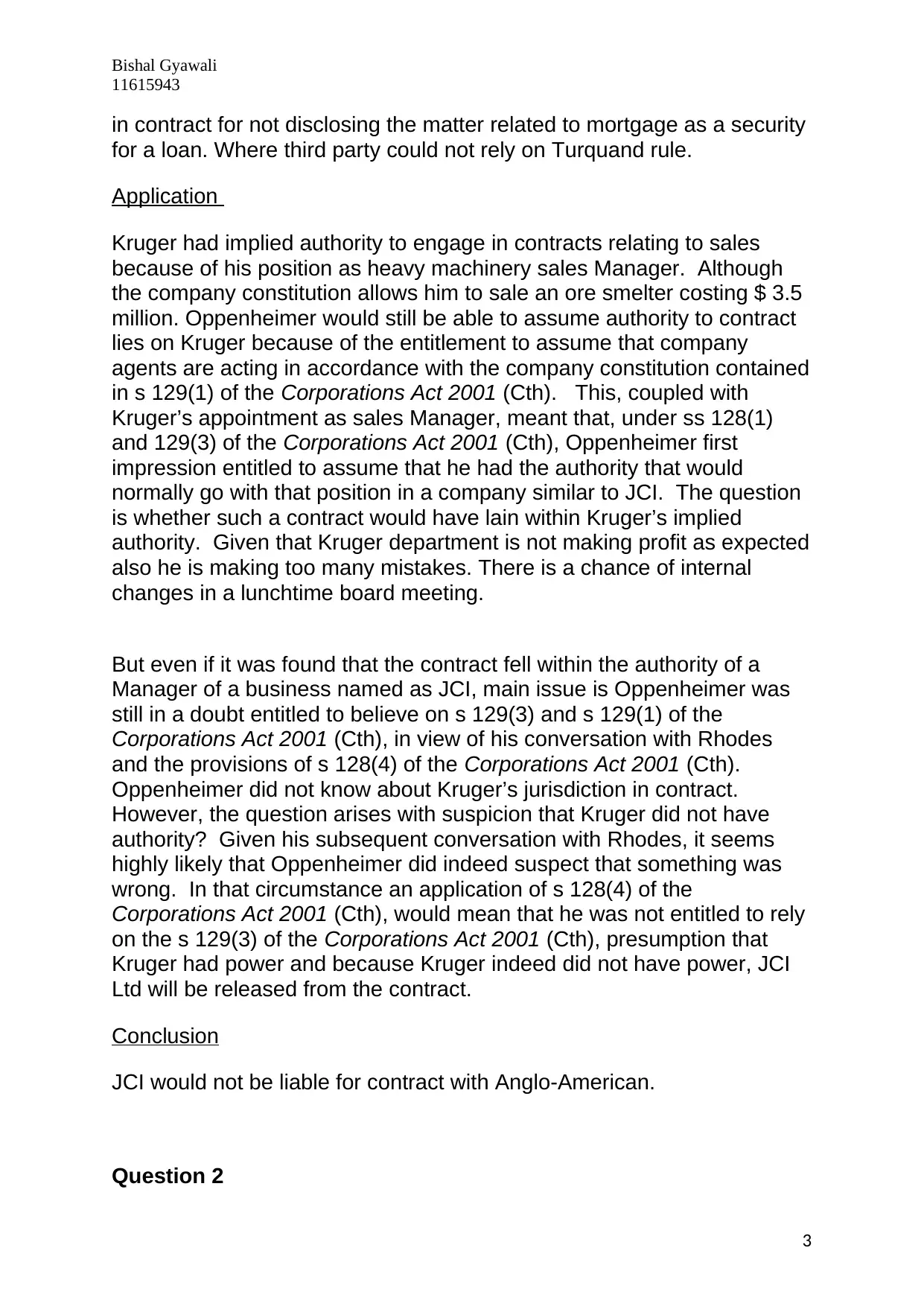
Bishal Gyawali
11615943
in contract for not disclosing the matter related to mortgage as a security
for a loan. Where third party could not rely on Turquand rule.
Application
Kruger had implied authority to engage in contracts relating to sales
because of his position as heavy machinery sales Manager. Although
the company constitution allows him to sale an ore smelter costing $ 3.5
million. Oppenheimer would still be able to assume authority to contract
lies on Kruger because of the entitlement to assume that company
agents are acting in accordance with the company constitution contained
in s 129(1) of the Corporations Act 2001 (Cth). This, coupled with
Kruger’s appointment as sales Manager, meant that, under ss 128(1)
and 129(3) of the Corporations Act 2001 (Cth), Oppenheimer first
impression entitled to assume that he had the authority that would
normally go with that position in a company similar to JCI. The question
is whether such a contract would have lain within Kruger’s implied
authority. Given that Kruger department is not making profit as expected
also he is making too many mistakes. There is a chance of internal
changes in a lunchtime board meeting.
But even if it was found that the contract fell within the authority of a
Manager of a business named as JCI, main issue is Oppenheimer was
still in a doubt entitled to believe on s 129(3) and s 129(1) of the
Corporations Act 2001 (Cth), in view of his conversation with Rhodes
and the provisions of s 128(4) of the Corporations Act 2001 (Cth).
Oppenheimer did not know about Kruger’s jurisdiction in contract.
However, the question arises with suspicion that Kruger did not have
authority? Given his subsequent conversation with Rhodes, it seems
highly likely that Oppenheimer did indeed suspect that something was
wrong. In that circumstance an application of s 128(4) of the
Corporations Act 2001 (Cth), would mean that he was not entitled to rely
on the s 129(3) of the Corporations Act 2001 (Cth), presumption that
Kruger had power and because Kruger indeed did not have power, JCI
Ltd will be released from the contract.
Conclusion
JCI would not be liable for contract with Anglo-American.
Question 2
3
11615943
in contract for not disclosing the matter related to mortgage as a security
for a loan. Where third party could not rely on Turquand rule.
Application
Kruger had implied authority to engage in contracts relating to sales
because of his position as heavy machinery sales Manager. Although
the company constitution allows him to sale an ore smelter costing $ 3.5
million. Oppenheimer would still be able to assume authority to contract
lies on Kruger because of the entitlement to assume that company
agents are acting in accordance with the company constitution contained
in s 129(1) of the Corporations Act 2001 (Cth). This, coupled with
Kruger’s appointment as sales Manager, meant that, under ss 128(1)
and 129(3) of the Corporations Act 2001 (Cth), Oppenheimer first
impression entitled to assume that he had the authority that would
normally go with that position in a company similar to JCI. The question
is whether such a contract would have lain within Kruger’s implied
authority. Given that Kruger department is not making profit as expected
also he is making too many mistakes. There is a chance of internal
changes in a lunchtime board meeting.
But even if it was found that the contract fell within the authority of a
Manager of a business named as JCI, main issue is Oppenheimer was
still in a doubt entitled to believe on s 129(3) and s 129(1) of the
Corporations Act 2001 (Cth), in view of his conversation with Rhodes
and the provisions of s 128(4) of the Corporations Act 2001 (Cth).
Oppenheimer did not know about Kruger’s jurisdiction in contract.
However, the question arises with suspicion that Kruger did not have
authority? Given his subsequent conversation with Rhodes, it seems
highly likely that Oppenheimer did indeed suspect that something was
wrong. In that circumstance an application of s 128(4) of the
Corporations Act 2001 (Cth), would mean that he was not entitled to rely
on the s 129(3) of the Corporations Act 2001 (Cth), presumption that
Kruger had power and because Kruger indeed did not have power, JCI
Ltd will be released from the contract.
Conclusion
JCI would not be liable for contract with Anglo-American.
Question 2
3
⊘ This is a preview!⊘
Do you want full access?
Subscribe today to unlock all pages.

Trusted by 1+ million students worldwide
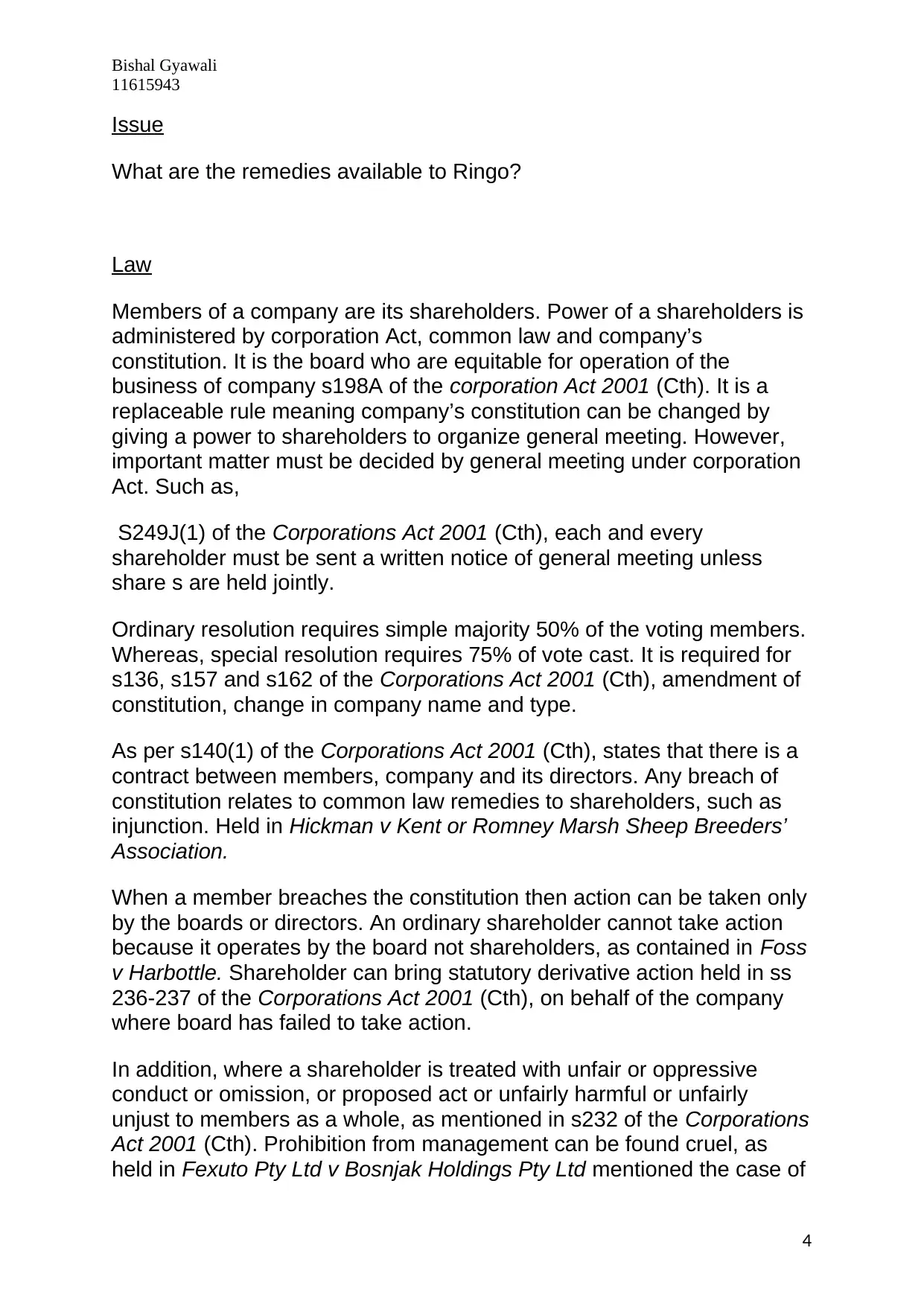
Bishal Gyawali
11615943
Issue
What are the remedies available to Ringo?
Law
Members of a company are its shareholders. Power of a shareholders is
administered by corporation Act, common law and company’s
constitution. It is the board who are equitable for operation of the
business of company s198A of the corporation Act 2001 (Cth). It is a
replaceable rule meaning company’s constitution can be changed by
giving a power to shareholders to organize general meeting. However,
important matter must be decided by general meeting under corporation
Act. Such as,
S249J(1) of the Corporations Act 2001 (Cth), each and every
shareholder must be sent a written notice of general meeting unless
share s are held jointly.
Ordinary resolution requires simple majority 50% of the voting members.
Whereas, special resolution requires 75% of vote cast. It is required for
s136, s157 and s162 of the Corporations Act 2001 (Cth), amendment of
constitution, change in company name and type.
As per s140(1) of the Corporations Act 2001 (Cth), states that there is a
contract between members, company and its directors. Any breach of
constitution relates to common law remedies to shareholders, such as
injunction. Held in Hickman v Kent or Romney Marsh Sheep Breeders’
Association.
When a member breaches the constitution then action can be taken only
by the boards or directors. An ordinary shareholder cannot take action
because it operates by the board not shareholders, as contained in Foss
v Harbottle. Shareholder can bring statutory derivative action held in ss
236-237 of the Corporations Act 2001 (Cth), on behalf of the company
where board has failed to take action.
In addition, where a shareholder is treated with unfair or oppressive
conduct or omission, or proposed act or unfairly harmful or unfairly
unjust to members as a whole, as mentioned in s232 of the Corporations
Act 2001 (Cth). Prohibition from management can be found cruel, as
held in Fexuto Pty Ltd v Bosnjak Holdings Pty Ltd mentioned the case of
4
11615943
Issue
What are the remedies available to Ringo?
Law
Members of a company are its shareholders. Power of a shareholders is
administered by corporation Act, common law and company’s
constitution. It is the board who are equitable for operation of the
business of company s198A of the corporation Act 2001 (Cth). It is a
replaceable rule meaning company’s constitution can be changed by
giving a power to shareholders to organize general meeting. However,
important matter must be decided by general meeting under corporation
Act. Such as,
S249J(1) of the Corporations Act 2001 (Cth), each and every
shareholder must be sent a written notice of general meeting unless
share s are held jointly.
Ordinary resolution requires simple majority 50% of the voting members.
Whereas, special resolution requires 75% of vote cast. It is required for
s136, s157 and s162 of the Corporations Act 2001 (Cth), amendment of
constitution, change in company name and type.
As per s140(1) of the Corporations Act 2001 (Cth), states that there is a
contract between members, company and its directors. Any breach of
constitution relates to common law remedies to shareholders, such as
injunction. Held in Hickman v Kent or Romney Marsh Sheep Breeders’
Association.
When a member breaches the constitution then action can be taken only
by the boards or directors. An ordinary shareholder cannot take action
because it operates by the board not shareholders, as contained in Foss
v Harbottle. Shareholder can bring statutory derivative action held in ss
236-237 of the Corporations Act 2001 (Cth), on behalf of the company
where board has failed to take action.
In addition, where a shareholder is treated with unfair or oppressive
conduct or omission, or proposed act or unfairly harmful or unfairly
unjust to members as a whole, as mentioned in s232 of the Corporations
Act 2001 (Cth). Prohibition from management can be found cruel, as
held in Fexuto Pty Ltd v Bosnjak Holdings Pty Ltd mentioned the case of
4
Paraphrase This Document
Need a fresh take? Get an instant paraphrase of this document with our AI Paraphraser
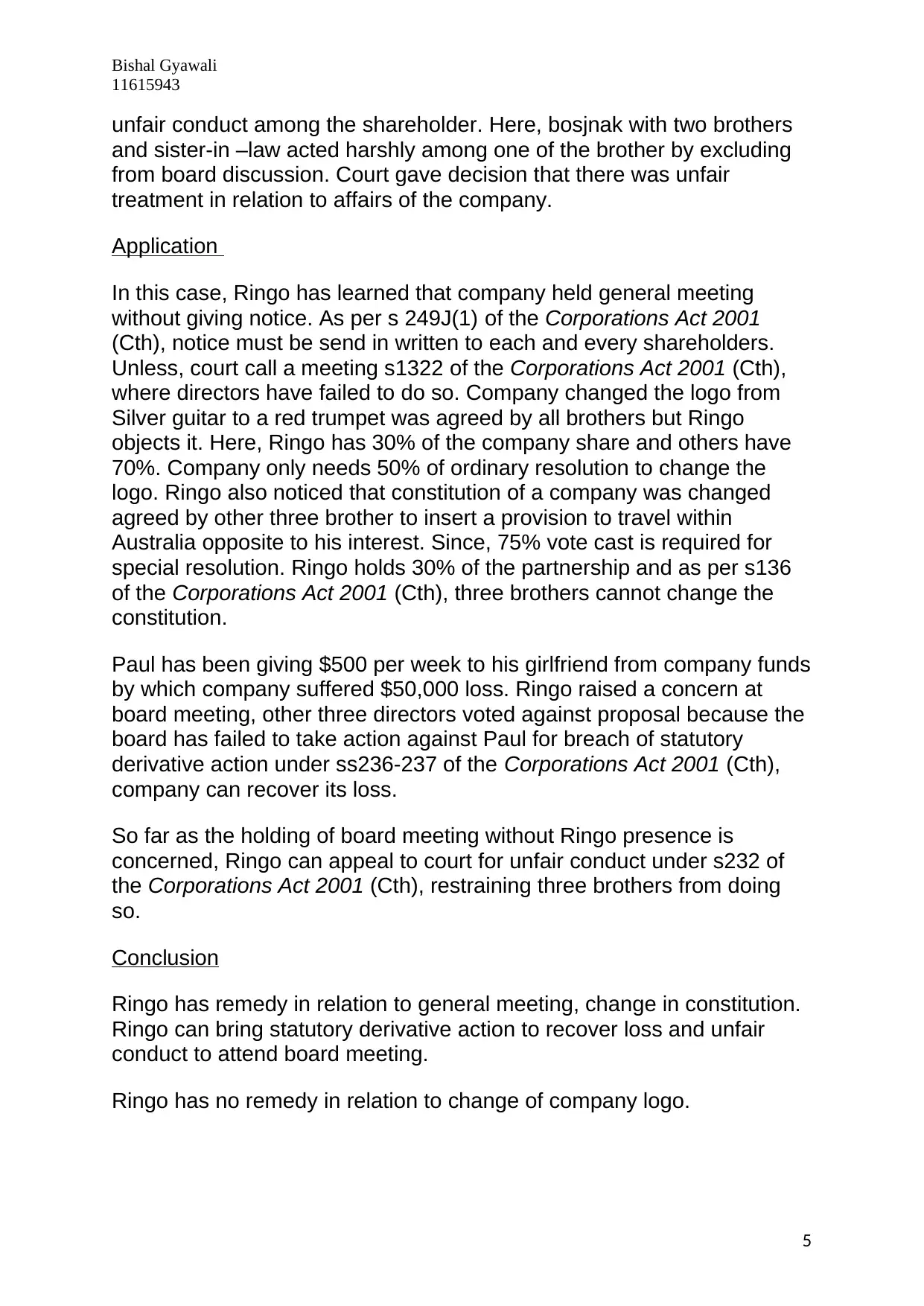
Bishal Gyawali
11615943
unfair conduct among the shareholder. Here, bosjnak with two brothers
and sister-in –law acted harshly among one of the brother by excluding
from board discussion. Court gave decision that there was unfair
treatment in relation to affairs of the company.
Application
In this case, Ringo has learned that company held general meeting
without giving notice. As per s 249J(1) of the Corporations Act 2001
(Cth), notice must be send in written to each and every shareholders.
Unless, court call a meeting s1322 of the Corporations Act 2001 (Cth),
where directors have failed to do so. Company changed the logo from
Silver guitar to a red trumpet was agreed by all brothers but Ringo
objects it. Here, Ringo has 30% of the company share and others have
70%. Company only needs 50% of ordinary resolution to change the
logo. Ringo also noticed that constitution of a company was changed
agreed by other three brother to insert a provision to travel within
Australia opposite to his interest. Since, 75% vote cast is required for
special resolution. Ringo holds 30% of the partnership and as per s136
of the Corporations Act 2001 (Cth), three brothers cannot change the
constitution.
Paul has been giving $500 per week to his girlfriend from company funds
by which company suffered $50,000 loss. Ringo raised a concern at
board meeting, other three directors voted against proposal because the
board has failed to take action against Paul for breach of statutory
derivative action under ss236-237 of the Corporations Act 2001 (Cth),
company can recover its loss.
So far as the holding of board meeting without Ringo presence is
concerned, Ringo can appeal to court for unfair conduct under s232 of
the Corporations Act 2001 (Cth), restraining three brothers from doing
so.
Conclusion
Ringo has remedy in relation to general meeting, change in constitution.
Ringo can bring statutory derivative action to recover loss and unfair
conduct to attend board meeting.
Ringo has no remedy in relation to change of company logo.
5
11615943
unfair conduct among the shareholder. Here, bosjnak with two brothers
and sister-in –law acted harshly among one of the brother by excluding
from board discussion. Court gave decision that there was unfair
treatment in relation to affairs of the company.
Application
In this case, Ringo has learned that company held general meeting
without giving notice. As per s 249J(1) of the Corporations Act 2001
(Cth), notice must be send in written to each and every shareholders.
Unless, court call a meeting s1322 of the Corporations Act 2001 (Cth),
where directors have failed to do so. Company changed the logo from
Silver guitar to a red trumpet was agreed by all brothers but Ringo
objects it. Here, Ringo has 30% of the company share and others have
70%. Company only needs 50% of ordinary resolution to change the
logo. Ringo also noticed that constitution of a company was changed
agreed by other three brother to insert a provision to travel within
Australia opposite to his interest. Since, 75% vote cast is required for
special resolution. Ringo holds 30% of the partnership and as per s136
of the Corporations Act 2001 (Cth), three brothers cannot change the
constitution.
Paul has been giving $500 per week to his girlfriend from company funds
by which company suffered $50,000 loss. Ringo raised a concern at
board meeting, other three directors voted against proposal because the
board has failed to take action against Paul for breach of statutory
derivative action under ss236-237 of the Corporations Act 2001 (Cth),
company can recover its loss.
So far as the holding of board meeting without Ringo presence is
concerned, Ringo can appeal to court for unfair conduct under s232 of
the Corporations Act 2001 (Cth), restraining three brothers from doing
so.
Conclusion
Ringo has remedy in relation to general meeting, change in constitution.
Ringo can bring statutory derivative action to recover loss and unfair
conduct to attend board meeting.
Ringo has no remedy in relation to change of company logo.
5
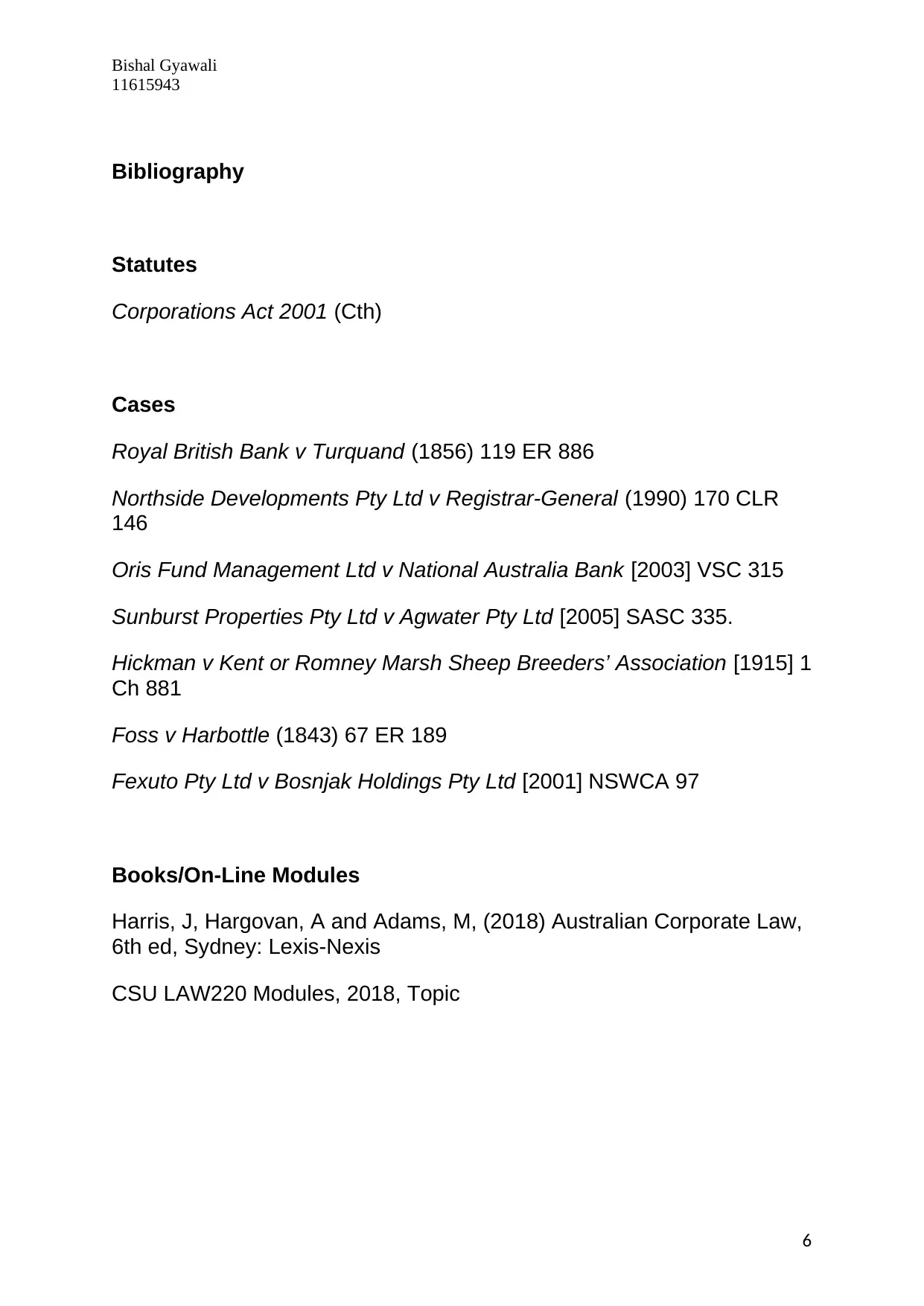
Bishal Gyawali
11615943
Bibliography
Statutes
Corporations Act 2001 (Cth)
Cases
Royal British Bank v Turquand (1856) 119 ER 886
Northside Developments Pty Ltd v Registrar-General (1990) 170 CLR
146
Oris Fund Management Ltd v National Australia Bank [2003] VSC 315
Sunburst Properties Pty Ltd v Agwater Pty Ltd [2005] SASC 335.
Hickman v Kent or Romney Marsh Sheep Breeders’ Association [1915] 1
Ch 881
Foss v Harbottle (1843) 67 ER 189
Fexuto Pty Ltd v Bosnjak Holdings Pty Ltd [2001] NSWCA 97
Books/On-Line Modules
Harris, J, Hargovan, A and Adams, M, (2018) Australian Corporate Law,
6th ed, Sydney: Lexis-Nexis
CSU LAW220 Modules, 2018, Topic
6
11615943
Bibliography
Statutes
Corporations Act 2001 (Cth)
Cases
Royal British Bank v Turquand (1856) 119 ER 886
Northside Developments Pty Ltd v Registrar-General (1990) 170 CLR
146
Oris Fund Management Ltd v National Australia Bank [2003] VSC 315
Sunburst Properties Pty Ltd v Agwater Pty Ltd [2005] SASC 335.
Hickman v Kent or Romney Marsh Sheep Breeders’ Association [1915] 1
Ch 881
Foss v Harbottle (1843) 67 ER 189
Fexuto Pty Ltd v Bosnjak Holdings Pty Ltd [2001] NSWCA 97
Books/On-Line Modules
Harris, J, Hargovan, A and Adams, M, (2018) Australian Corporate Law,
6th ed, Sydney: Lexis-Nexis
CSU LAW220 Modules, 2018, Topic
6
⊘ This is a preview!⊘
Do you want full access?
Subscribe today to unlock all pages.

Trusted by 1+ million students worldwide
1 out of 6
Related Documents
Your All-in-One AI-Powered Toolkit for Academic Success.
+13062052269
info@desklib.com
Available 24*7 on WhatsApp / Email
![[object Object]](/_next/static/media/star-bottom.7253800d.svg)
Unlock your academic potential
Copyright © 2020–2026 A2Z Services. All Rights Reserved. Developed and managed by ZUCOL.



